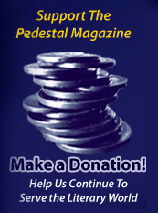|
POETRY
Introduction from the Editor ...
Lisette Alonso - Boys Will B ...
Sara Backer - Unfinished
Ace Boggess - I Donít Know W ...
Joan Colby - The Dress
Todd Follett - Go Fever
Alec Hershman - Chastity
Michael Kriesel - Invisible ...
Bonnie Wai-Lee Kwong - Two P ...
Gregory Mahrer - Exhibition
Myron Michael - Mural
Daniel Riddle Rodriguez - Ho ...
Mehnaz Sahibzada - The Weath ...
Eric Paul Shaffer - Angry at ...
Steven Shields - I Am Ten
Heather H. Thomas - Vapor
Rhiannon Thorne - See How th ...
Pepper Trail - Suriname 1981
Chad Weeden - Bathroom Stall
David Welper - Notes Regardi ...
Lisette Alonso - Boys Will B ...
Sara Backer - Unfinished
Ace Boggess - I Donít Know W ...
Joan Colby - The Dress
Todd Follett - Go Fever
Alec Hershman - Chastity
Michael Kriesel - Invisible ...
Bonnie Wai-Lee Kwong - Two P ...
Gregory Mahrer - Exhibition
Myron Michael - Mural
Daniel Riddle Rodriguez - Ho ...
Mehnaz Sahibzada - The Weath ...
Eric Paul Shaffer - Angry at ...
Steven Shields - I Am Ten
Heather H. Thomas - Vapor
Rhiannon Thorne - See How th ...
Pepper Trail - Suriname 1981
Chad Weeden - Bathroom Stall
David Welper - Notes Regardi ...

REVIEWS
Stanley Nelson, Poet of Broo ...
Melissa Studdard's I Ate ...
Christopher Shipman's Cat ...
Richard Krawiec's Women W ...
Barbara Ungar's Immortal ...
Alice Osborn's Heroes wit ...
Tim Parks's Where I'm Wri ...
Melissa Studdard's I Ate ...
Christopher Shipman's Cat ...
Richard Krawiec's Women W ...
Barbara Ungar's Immortal ...
Alice Osborn's Heroes wit ...
Tim Parks's Where I'm Wri ...

| |


 Tim Parks
Tim Parks